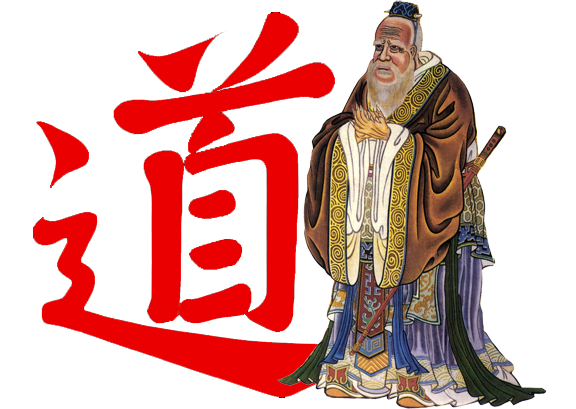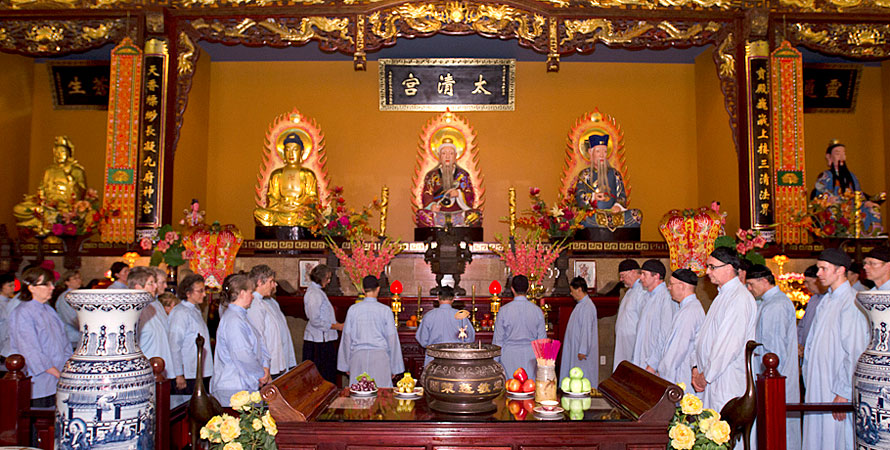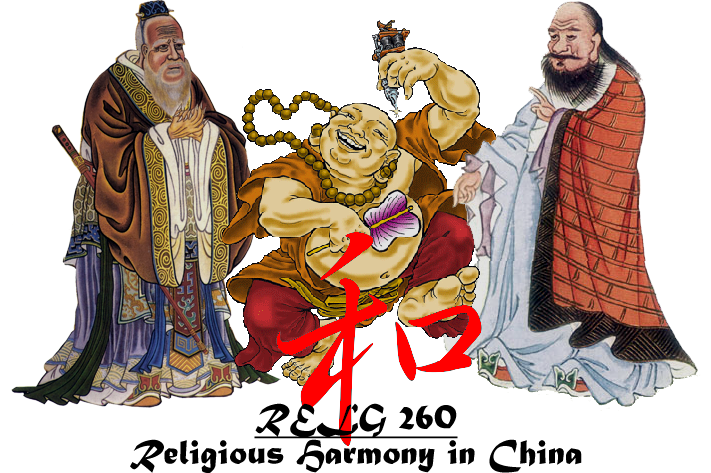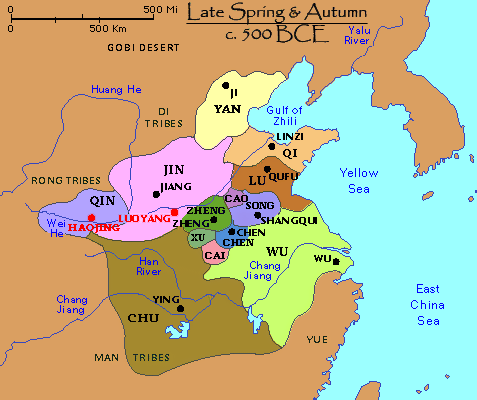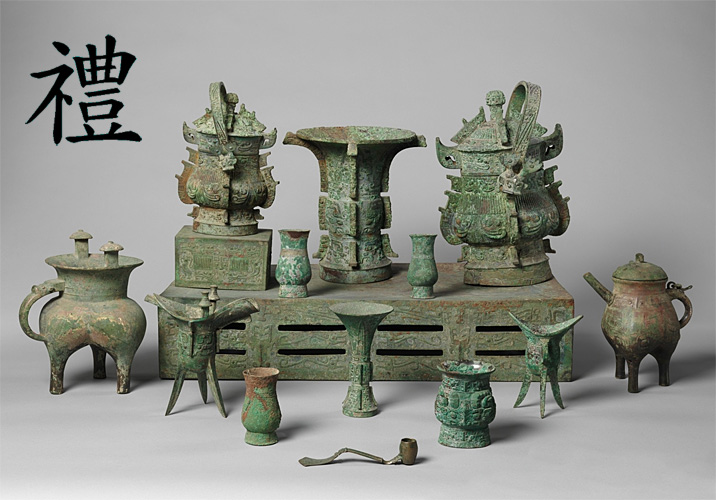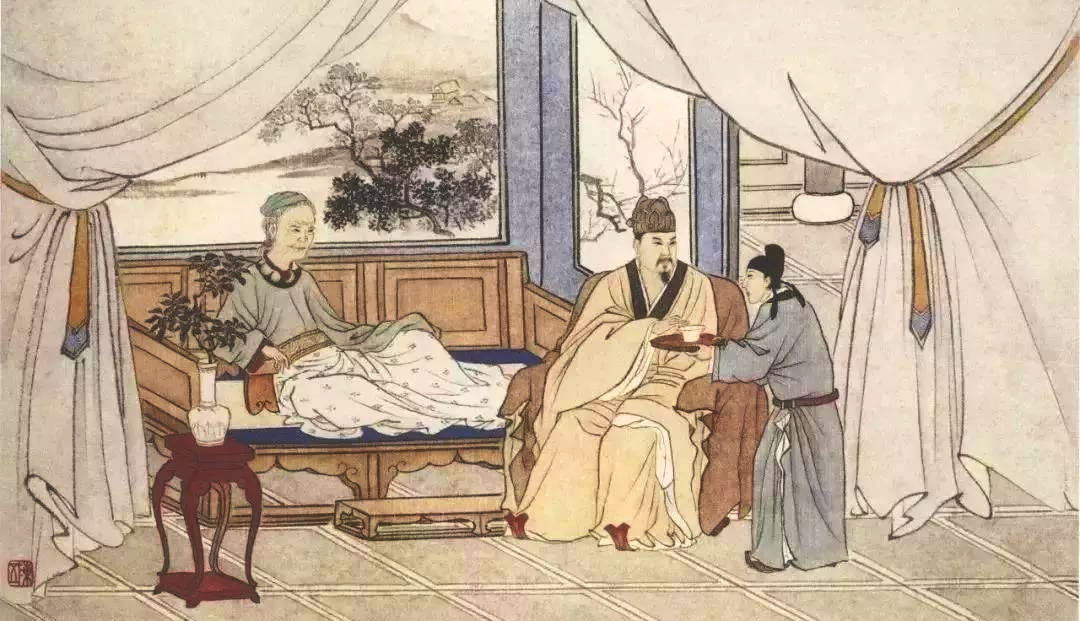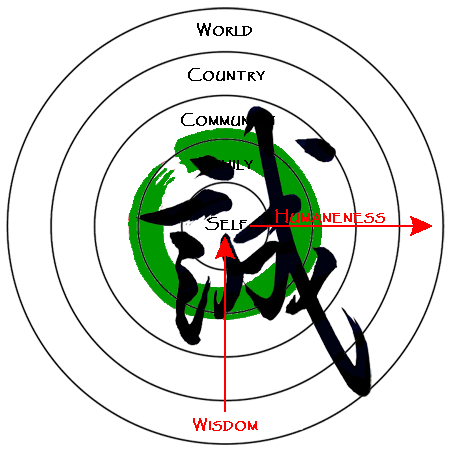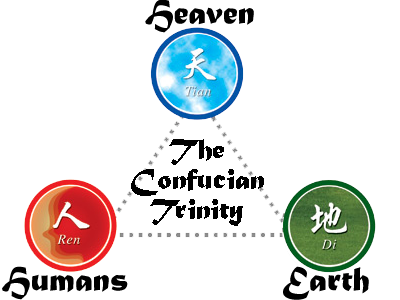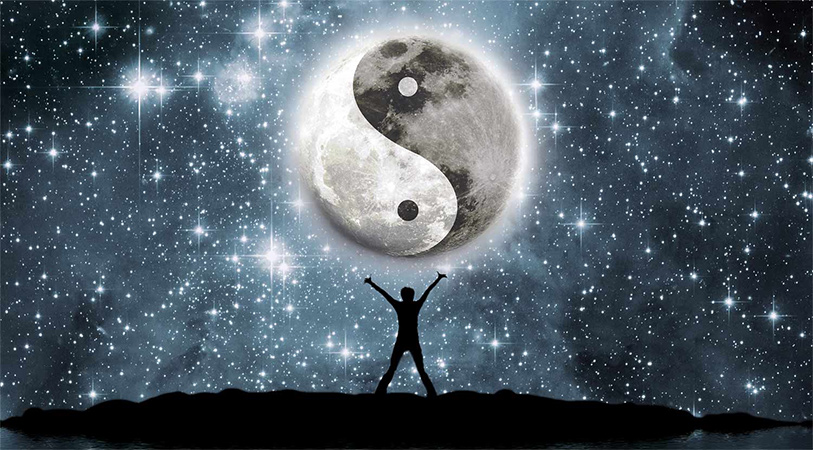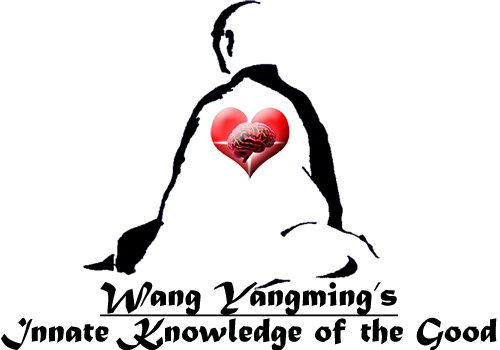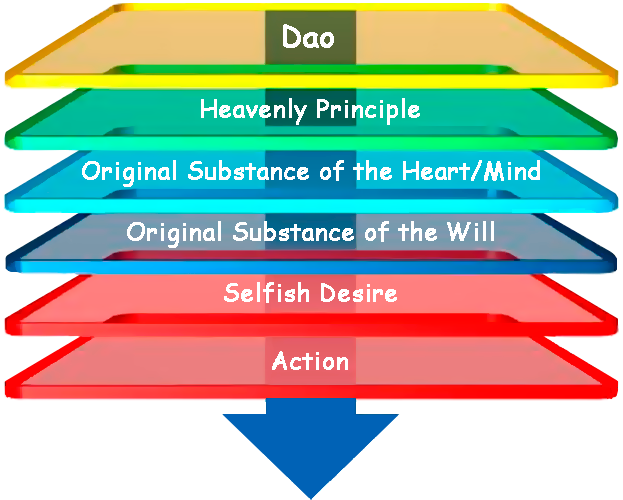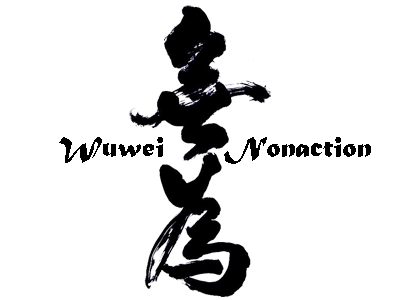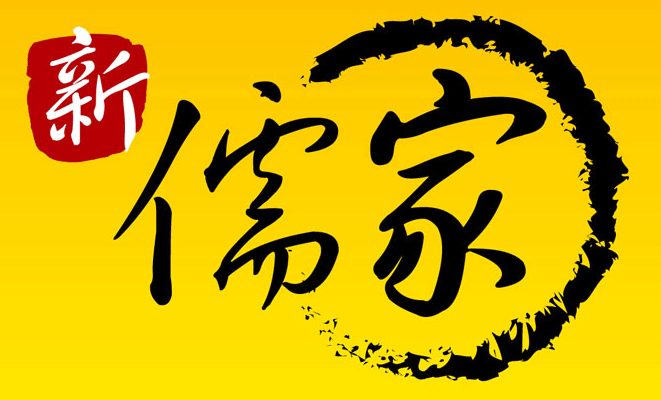The Teachings of Confucius
551-479 BCE
Confucius was born in ... a period of political chaos, with the stability of the early Zhou dynasty
giving way to disorder. As central power weakened, feudal lords held
more power than kings of the central court, minsters assassinated their
rulers, and sons killed their fathers. Confucius felt that a return to
classical rites and standards of virtue was the only way out of the
chaos, and he unsuccessfully sought rulers who would adopt his ideas.
He then turned to a different approach: training young men to be wise
and altruistic public servants. ...
After
his death in 479 BCE, interstate warfare increased, ancient family
loyalties were replaced by large and impersonal armies, and personal
virtues were replaced by laws and state control. After the brutal
reunification of China by the Qin dynasty, however, rulership required
a more cultured class of bureaucrats who could embody the virtues
advocated by Confucius. In the second century BCE the Confucian
Classics thus became the basis of training for the scholar-officials
who were to serve in the government. The life of the gentleman-scholar
devoted to proper government became the highest professed ideal.
Eventually temples were devoted to the worship of Confucius himself as
the model for unselfish public service, human kindness, and
scholarship. However, the official state use of the Confucian Classics
can be seen as a political device to give the government a veneer of
civility. (Living Religions, 206-7)
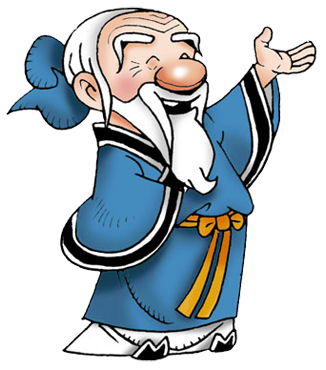
Although Confucius did not speak much about an unseen Reality, he asserted that li are the earthly expressions of the natural cosmic order. Everything should be done with a sense of propriety. (Living Religions, 209)
No matter what kind of simple fare it might be, such as coarse rice or
broth, he would always make an offering, doing so with due solemnity. (Analects 10:6)
“Sacrifice as if present” means sacrificing to the spirits as if the spirits were present. The Master said “If I do not fully invest myself in the
sacrifice, it is as if I did not sacrifice at all.” (Analects 3:12; translated by Brian Hoffert)
|
| Yan Yuan asked about humaneness. The
Master
said, “Through mastering oneself and returning
to ritual one becomes
humane. If for a
single day one can master oneself and return to ritual,
the
whole
world will return to humaneness. Does the practice of humaneness
come
from oneself or from others?” Yan Yuan said, “May I ask about the
specifics
of this?” The Master said, “Look at nothing contrary to ritual;
listen
to nothing contrary to ritual; say nothing contrary to ritual; do
nothing
contrary to ritual.” (Sources of Chinese Tradition, 55 [Analects 12:1]) |
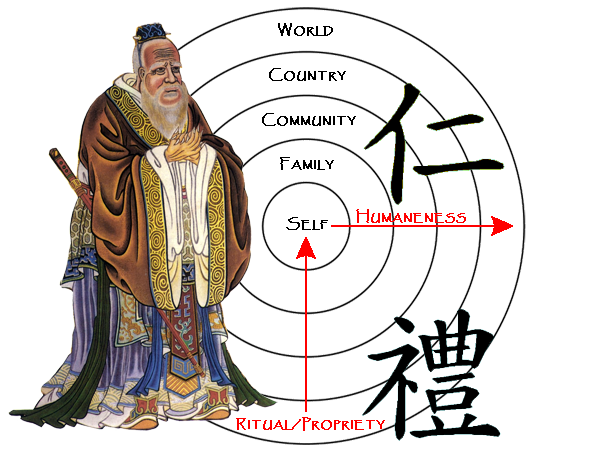 Humaneness/Benevolence (Ren)
Humaneness/Benevolence (Ren)
With
regard to humaneness: wishing to establish oneself, one helps to
establish others; wishing to develop oneself, one helps to develop
others. The ability to take one’s own wishes as a guide [for how to treat others] — this may be called the method of [cultivating] humaneness. (Analects, 6:30, translated by Brian Hoffert)
|
As the Great
Learning states it, peace begins with the moral cultivation of the
individual and order in the family. This peace extends outward to society,
government, and the universe itself like circular ripples in a pond. (Living Religions, 208)
|

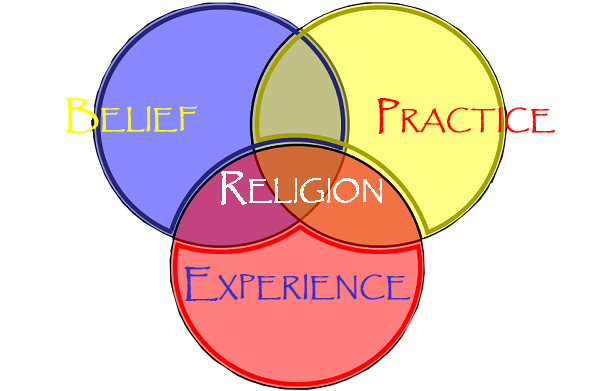
Is this approach to self-cultivation "religious" ... or merely "moral"?
|
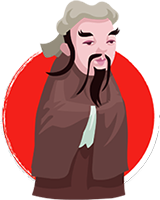 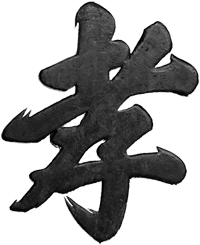
In addition to the five classic virtues, Confucius emphasized filial piety to parents. According to Confucian doctrine, there are three grades of filial piety: the lowest is to support one’s parents, the second is not to bring humiliation to one’s parents and ancestors, and the highest is to glorify them. In the ancient Book of Rites, as revived by Confucius, deference to one’s parents is scrupulously defined. For instance, a husband and his wife should go to visit their parents and parents-in-law, whereupon:
On getting to
where they are, with bated
breath
and gentle voice, they should ask if their clothes are (too) warm or
(too)
cold, whether they are ill or pained, or uncomfortable in any part; and
if
they be so, they should proceed reverently to stroke and scratch the
place. They should in the same way, going before or following after, help and
support
their parents in quitting or entering (the apartment). In
bringing
in the basin for them to wash, the younger will carry the stand and the
elder
the water; they will beg to be allowed to pour out the water, and when
the
washing is concluded, they will hand the towel. They will ask
whether
they want anything, and then respectfully bring it. All this they
will
do with an appearance of pleasure to make their parents feel at ease. (Living Religions, 208)
|
Ancestor Worship
Imperial Sacrifice to Heaven

Can such "rituals" lead to personal transformation ...
and if so, is this transformation "religious"?
|

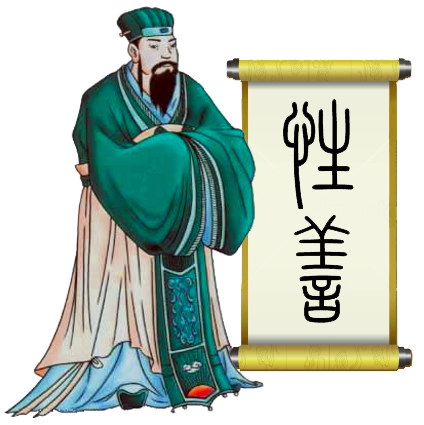
2A:6
“All human
beings have a mind that cannot bear to see the sufferings
of others. The ancient kings had a commiserating mind and,
accordingly,
a commiserating government. Having a commiserating mind, a
commiserating
government, governing the world was like turning something around on
the
palm of the hand.
“Here
is why I say that all human beings
have a mind that commiserates
with others. Now, if anyone were suddenly to see a child about to
fall
into a well, his mind would always be filled with alarm, distress,
pity,
and compassion. That he would react accordingly is not because he
would
use the opportunity to ingratiate himself with the child’s parents, nor
because
he would seek commendation from neighbors and friends, nor because he
would
hate the adverse reputation. From this it may be seen that one
who
lacks a mind that feels pity and compassion would not be human; one who
lacks
a mind that feels shame and aversion would not be human; one who lacks
a mind
that feels modesty and compliance would not be human; and one who lacks
a
mind that knows right and wrong would not be human.
“The
mind’s feeling of pity and compassion is the beginning of humaneness (ren);
the mind’s feeling of shame and aversion is the beginning of rightness (yi);
the mind’s feeling of modesty and compliance is the beginning of
propriety
(li); and the mind’s sense of right and wrong is the beginning
of
wisdom (zhi).
“Human beings have these four beginnings just as they have
four
limbs. For one to have these four beginnings and yet to say of
oneself
that one is unable to fulfill them is to injure oneself, while to say
that
one’s ruler is unable to fulfill them is to injure one’s ruler. When
we know how to enlarge and bring to fulfillment these four beginnings
that
are within us, it will be like a fire beginning to burn or a spring
finding
an outlet. If one is able to bring them to fulfillment, they will
be
sufficient to enable him to protect ‘all within the four seas’; if one
is
not, they will be insufficient even to enable him to serve his parents.” (SCT, 129)

Mengzi said, “One
who fully realizes their heart/mind will understand their nature.
Understanding their nature, they will know Heaven. Preserving their
heart/mind and nurturing their nature is the way to serve Heaven. To
singlemindedly cultivate oneself without worrying about premature death
or long life is the way to take up [Heaven’s] Mandate.” (Mengzi 7A1; translated by Brian Hoffert)
|
 Is this approach to self-cultivation religious?
Is this approach to self-cultivation religious? |
 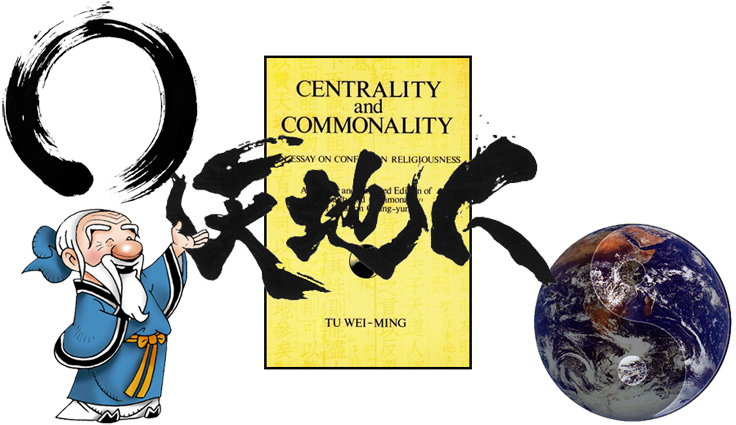 Sincerity is the
Way of Heaven. To think
how to be sincere is the way of man. He who is sincere is one who hits
upon what is right without effort and apprehends without thinking. He
is naturally and easily in harmony with the Way. Such a man is a sage.
He who tries to be sincere is one who chooses the good
and holds fast to it. (A Soure Book in Chinese Philosophy, 107)Sincerity is the beginning and end of things. Without sincerity
there
would be nothing. Therefore the superior man values
sincerity. Sincerity is not only the completion of one’s own self, it is that by
which
all things are completed. The completion of the self means
humanity. The completion of all things means wisdom. These are the
character
of [human] nature, and they are the Way in which the internal and the
external
are united. Therefore whenever it is employed, everything done is
right. (A Source Book in Chinese Philosophy, 108)
Only
those who are absolutely sincere can
fully develop their nature. If they can fully develop their nature, they can fully develop the
nature of others. If they can fully develop the nature of others,
they can then fully develop the nature of things. If they can
fully
develop the nature of things, they can then assist in the transforming
and nourishing process of Heaven and Earth. If they can assist in
the transforming and nourishing process of Heaven and Earth, they can
thus
form a trinity with Heaven and Earth. (Centrality & Commonality, 77)
 Is this religious yet?
Is this religious yet? |
 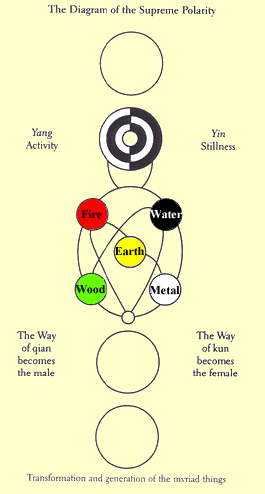 |
“Neo-Confucianism”
Buddhism
and Daoism became very popular during the period of disunity that
followed the fall of the Han dynasty, and Confucianism declined. But
during the Song dynasty (960-1280), Confucianism was revived, on the
premise that Buddhism and Daoism had brought moral and thus political
weakness into Chinese society. This revised version is referred to by Western scholars as
Neo-Confucianism. ... Neo-Confucian thinkers ... further developed the metaphysical
basis for Confucianism: the individual is intimately linked with all of
the cosmos. According to ZHANG Zai’s (Chang Tsai) Western Inscription:
| Heaven is my father and earth is my mother and
even
such
a small creature as I finds an intimate place in their midst. Therefore,
that which extends throughout the universe I regard as my body and that which
directs
the universe I consider as my nature. All people are my brothers
and
sisters and all things are my companions. The great ruler [the
emperor]
is the eldest son of my parents [Heaven and Earth], and the great
ministers
are his stewards. … To rejoice in Heaven and to have no anxiety — this is filial piety at its purest. |
By
becoming more humane one can help to transform not only oneself but
also society and even the cosmos. The Neo-Confucianists thus stressed
the importance of meditation and dedication to becoming a sage. (Living Religions, 212)
Confucian ethics insists
that the self be the center of relationships,
not
in order to claim one’s rights but to claim to be responsible; and that
a
sense of the community of trust must be modeled on the family, not in a
way
that excludes others but in a way that extends one’s family affection
to
a wider world. According to a Confucian understanding, daily
behaviour
must be guided by an established ritual, not merely for restricting
individuals,
but more for cultivating the sense of holiness and mission in their
heart. Education is essential for building up a good character, not primarily
for
building up one’s physical power to conquer what is unknown, but for
the
ability to cooperate with others and to be in harmony with nature and
the
universe. ...
| The Confucian faith is fundamentally humanistic, which lays
the
responsibility for a better world and for a secured future, not in the
hands
of a supremely detached God, but in the hands of ordinarily engaged
humans.
In this sense, Confucianism provides us with an alternative way of
dealing
with the meaning of life and the meaning of death. ... |
For a Confucian, the
meaning
of life can be realized only in learning and practice, in bringing
oneself
to the standard of a gentleman (i.e. a morally cultivated person) and
the
society to the standard of Great Unity: the destiny of a human
can
be fulfilled only in establishing words, merits and virtues for
generations
to come. (Xinzhong Yao in Anthology of Living Religions, 159-60)
Is Confucianism a Religion?
Mary Pat Fisher
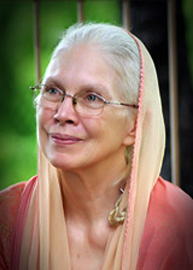 [According
to Mengzi,]
Heaven empowers the righteous, for there is a direct
connection between the goodness of human nature and the nature of
Heaven. Learning is therefore ideally a process of coming to understand
the Way of Heaven. ... [According to Xunzi, human nature is flawed, and
yet] humans can gradually attain sagehood by persistent study,
patience, and good works and thereby form a cooperative triad with
Heaven and Earth. ... These basic points situate Confucianism within
the academic category that can be referred to as “religion,” if
religion is defined broadly as Frederick Streng did: “a means to
ultimate transformation.” All things considered, Confucian Studies
Professor Rodney L. Taylor concludes: “The key to the religious
interpretation of Confucianism lies in the role of Heaven, not just as
an authority for the stability of society, but as a source of religious
authority and inspiration for the individual.” The goal of Confucian
learning is to become a sage, fully cultivating one’s inner virtues and
always acting according to righteousness, in accord with the Way of
Heaven. (Living Religions, 209-10) [According
to Mengzi,]
Heaven empowers the righteous, for there is a direct
connection between the goodness of human nature and the nature of
Heaven. Learning is therefore ideally a process of coming to understand
the Way of Heaven. ... [According to Xunzi, human nature is flawed, and
yet] humans can gradually attain sagehood by persistent study,
patience, and good works and thereby form a cooperative triad with
Heaven and Earth. ... These basic points situate Confucianism within
the academic category that can be referred to as “religion,” if
religion is defined broadly as Frederick Streng did: “a means to
ultimate transformation.” All things considered, Confucian Studies
Professor Rodney L. Taylor concludes: “The key to the religious
interpretation of Confucianism lies in the role of Heaven, not just as
an authority for the stability of society, but as a source of religious
authority and inspiration for the individual.” The goal of Confucian
learning is to become a sage, fully cultivating one’s inner virtues and
always acting according to righteousness, in accord with the Way of
Heaven. (Living Religions, 209-10)
Xinzhong Yao
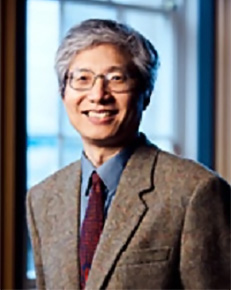 As a religion, Confucianism is indeed of special
character. The backbone of Confucian doctrines is composed of three
principles: harmony and unity between humanity and Heaven, harmony and
unity between descendants and ancestors, harmony and unity between the
secular and the sacred (Yao, 1996a: 31-3). In analysing, and expanding
on, these three dimensions of harmony, Confucianism develops a
systematic and unique doctrine of human religiosity. This is a kind of
humanism, because it concentrates on solving secular problems and
insists on human perfectibility. However, Confucianism is not
humanistic in the normal sense of this term, because it does not end
with the material satisfaction of human needs, nor does it reject
pursuing the spiritual Absolute. Although it holds a different
conception of what can be counted as the ‘spiritual’,
Confucianism does have a common sense of the ultimacy of a personal
experience of the sacred and a personal commitment to the Ultimate. It
is thus a humanistic religion, a humanistic tradition manifesting
spiritual longing and discipline in its classics, creed, practices and
institutions, and leading to a religious destination that answers human
ultimate concerns. These concerns are expressed through individual and
communal commitments and revealed by the desires to transform self and
society according to their moral and political vision. (An Introduction to Confucianism, 45) As a religion, Confucianism is indeed of special
character. The backbone of Confucian doctrines is composed of three
principles: harmony and unity between humanity and Heaven, harmony and
unity between descendants and ancestors, harmony and unity between the
secular and the sacred (Yao, 1996a: 31-3). In analysing, and expanding
on, these three dimensions of harmony, Confucianism develops a
systematic and unique doctrine of human religiosity. This is a kind of
humanism, because it concentrates on solving secular problems and
insists on human perfectibility. However, Confucianism is not
humanistic in the normal sense of this term, because it does not end
with the material satisfaction of human needs, nor does it reject
pursuing the spiritual Absolute. Although it holds a different
conception of what can be counted as the ‘spiritual’,
Confucianism does have a common sense of the ultimacy of a personal
experience of the sacred and a personal commitment to the Ultimate. It
is thus a humanistic religion, a humanistic tradition manifesting
spiritual longing and discipline in its classics, creed, practices and
institutions, and leading to a religious destination that answers human
ultimate concerns. These concerns are expressed through individual and
communal commitments and revealed by the desires to transform self and
society according to their moral and political vision. (An Introduction to Confucianism, 45)
|
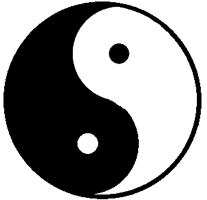 Confucianism & Daoism
According to Yu Yingshi, “For
Chinese, the transcendental world, the world of the spirit,
interpenetrates with the everyday world though it is not considered
identical to it. ... So mundane human
relationships are, from the very beginning, endowed with a
transcendental character.” (Living Religions, 206)
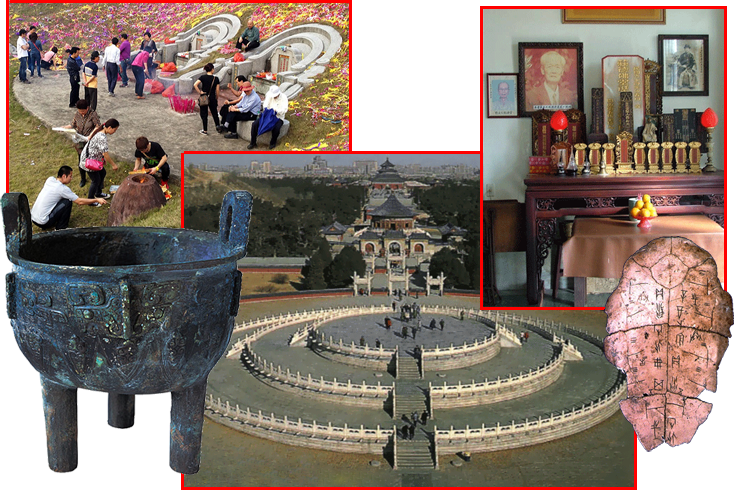
What does this tell us about the relationship between Confucianism and Daoism?
|

|

